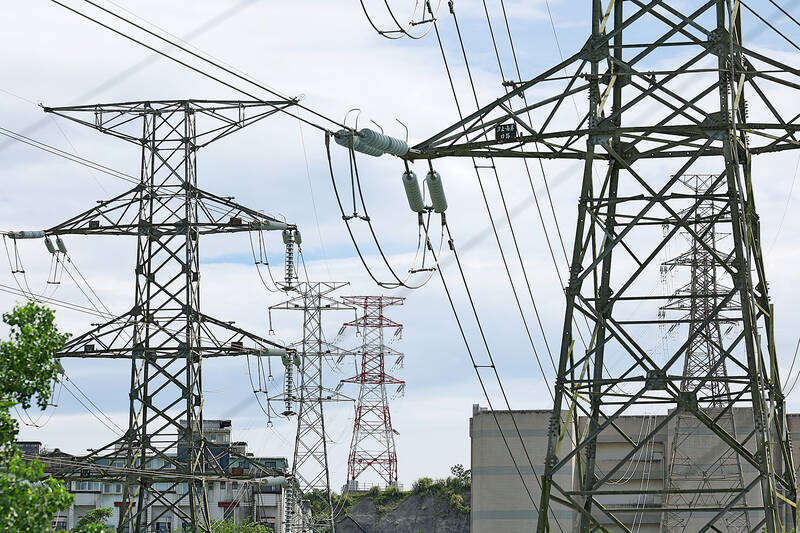Taiwan’s industrial electricity consumption last month rose 1.12 percent year-on-year, fueled by surging demand from artificial intelligence (AI) applications and next-generation consumer electronics, the Taiwan Research Institute (台綜院) said yesterday.
The New Taipei City-based institute, which publishes the electricity prosperity index (EPI) to gauge the health of industrial sectors, reported that the index flashed “yellow-red,” indicating a thriving state despite mounting disparities across industries. The reading reflects robust activity in technology-related sectors, even as traditional industries face headwinds.
Taiwan’s semiconductor sector continued its remarkable growth, with electricity consumption for the industry climbing 9.53 percent year-on-year and reaching a record high, the institute said.

Photo: CNA
The EPI’s electricity activity index for the sector has signaled strong demand with a red light for five consecutive months, underscoring the sustained expansion of the semiconductor industry.
Taiwan is home to the world’s largest supplier of advanced chips used in AI and high-performance computing, a position that continues to bolster industrial energy demand, the institute said.
Firms in the computer, electronics and optical products sector also recorded strong growth, with electricity consumption up 5.59 percent, it said, linking the rise to AI and cloud server deployment, as well as the launch of new consumer electronics products.
Apple Inc’s unveiling of its latest-generation iPhones, iPods and Apple Watch earlier this month contributed to higher business activity at local suppliers of camera lenses, casings, display panels, battery packs and other components, it added.
This increase occurred despite the recent implementation of US reciprocal tariffs, highlighting the resilience of Taiwan’s tech manufacturing ecosystem, the institute said.
Overall high-voltage electricity use across Taiwan edged up 0.6 percent from a year earlier, with the manufacturing sector up 0.31 percent and service providers up 1.41 percent, it said.
However, not all sectors experienced positive developments. Electricity consumption fell 9.41 percent at local steelmakers, dropped 16.37 percent at textile firms and declined 11.96 percent at machinery tool vendors.
Rising production costs due to Taiwan’s environmental policies and global shifts toward greener chemicals have placed additional pressure on chemical product manufacturers.
Moreover, China, previously a major importer of Taiwanese chemicals, has expanded its domestic production, reducing demand for imports from Taiwan.
The institute expects the ongoing AI boom to continue fueling growth in the semiconductor sector, helping to offset downturns in non-tech industries and supporting the overall economy.
At the same time, the institute said that Taiwan must carefully monitor global economic uncertainties, including potential US tariff threats, to mitigate downside risks to local industries.

In Italy’s storied gold-making hubs, jewelers are reworking their designs to trim gold content as they race to blunt the effect of record prices and appeal to shoppers watching their budgets. Gold prices hit a record high on Thursday, surging near US$5,600 an ounce, more than double a year ago as geopolitical concerns and jitters over trade pushed investors toward the safe-haven asset. The rally is putting undue pressure on small artisans as they face mounting demands from customers, including international brands, to produce cheaper items, from signature pieces to wedding rings, according to interviews with four independent jewelers in Italy’s main

Japanese Prime Minister Sanae Takaichi has talked up the benefits of a weaker yen in a campaign speech, adopting a tone at odds with her finance ministry, which has refused to rule out any options to counter excessive foreign exchange volatility. Takaichi later softened her stance, saying she did not have a preference for the yen’s direction. “People say the weak yen is bad right now, but for export industries, it’s a major opportunity,” Takaichi said on Saturday at a rally for Liberal Democratic Party candidate Daishiro Yamagiwa in Kanagawa Prefecture ahead of a snap election on Sunday. “Whether it’s selling food or

CONCERNS: Tech companies investing in AI businesses that purchase their products have raised questions among investors that they are artificially propping up demand Nvidia Corp chief executive officer Jensen Huang (黃仁勳) on Saturday said that the company would be participating in OpenAI’s latest funding round, describing it as potentially “the largest investment we’ve ever made.” “We will invest a great deal of money,” Huang told reporters while visiting Taipei. “I believe in OpenAI. The work that they do is incredible. They’re one of the most consequential companies of our time.” Huang did not say exactly how much Nvidia might contribute, but described the investment as “huge.” “Let Sam announce how much he’s going to raise — it’s for him to decide,” Huang said, referring to OpenAI

The global server market is expected to grow 12.8 percent annually this year, with artificial intelligence (AI) servers projected to account for 16.5 percent, driven by continued investment in AI infrastructure by major cloud service providers (CSPs), market researcher TrendForce Corp (集邦科技) said yesterday. Global AI server shipments this year are expected to increase 28 percent year-on-year to more than 2.7 million units, driven by sustained demand from CSPs and government sovereign cloud projects, TrendForce analyst Frank Kung (龔明德) told the Taipei Times. Demand for GPU-based AI servers, including Nvidia Corp’s GB and Vera Rubin rack systems, is expected to remain high,